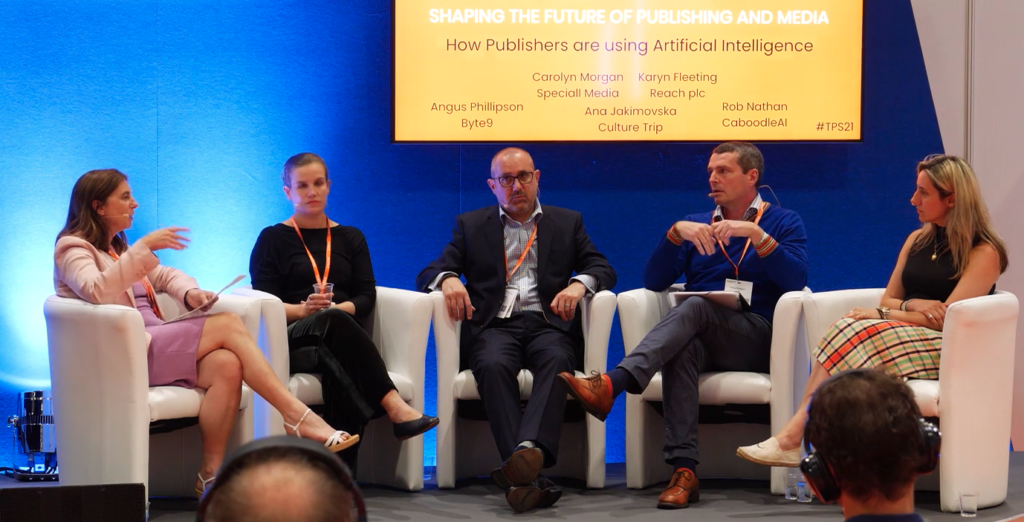How are publishers using artificial intelligence right now? Are there some real-world practical examples behind the sci-fi hype? Is it really going to undermine the role of journalists?
I chaired a panel at The Publishing Show that brought together traditional publishers and digital native start-ups. They shared how they are using AI and machine learning to create and curate content, sort it, and tag it, and enhance advertising.
I was joined by
- Karyn Fleeting, Customer Delivery Director at Reach PLC.
- Rob Nathan, Group Marketing Director at Media 10.
- Angus Philipson, Founder at Byte9
- Ana Jakimovska, Chief Product Officer and CTO at Culture Trip.
AI in Content creation
Many journalists are concerned that AI will be used to write articles, but the technology is nowhere near that sophisticated. However, there are applications in creating simple listing or directory style articles. For example, Byte9 helps Boat International create automated yacht descriptions from imported data. More often, AI is used to make journalists life easier. In their regional news media, Reach use DataMinr and Krzana to sift through social media to identify breaking stories that justify despatching a reporter. Byte9 has helped Informa convert text stories to speech using AI. Culture Trip creates commissioning templates so that users can submit recommendations for local restaurants or attractions in their own language.
AI in content curation
Caboodle is an AI tool acquired by Media 10, that creates specialist content feeds and newsletters for event organisers and associations from third party sources. This maintains engagement with a niche audience between events without having to hire an editor. Reach is working with a third-party provider called BlueVenn to create more personalised newsletters for their readers. Culture Trip use AI to spot the gaps in coverage in regions or cities and then automatically commission new content from their contributors.
AI in tagging and sorting content
Tagging content is certainly not the favourite job of most journalists and is an established application for AI. Byte9 have used IBM Watson and Amazon Web Services (AWS) machine learning to automatically tag article content and analyse the context to deliver more accurate related articles. They have also used AWS to classify and tag images.
AI in advertising
Reach have built a brand safety platform with IBM Watson called Mantis. This adds context to keywords that may be blocked by advertisers. For example, an advertiser might want to block the word “shoots” in case it relates to a crime but is happy to appear next to articles about football. Mantis can help advertisers tell the difference. This is now available for use by other publishers.
AI for communities
Niche publisher Singletrack uses AWS tools to spot spam posts in their classified online communities – this is over 95% accurate and saves staff time. They also use AI for sentiment analysis on forum posts.
Practical advice on starting out with AI in publishing
The panel shared their top tips on publishers using AI for the first time
• Work out what your challenge is first, before you jump to a tech solution
• Buy rather than build your solution. There are many third-party tools out there that you can use. Smaller publishers may not be able to hire specialist data scientists.
• AI or machine learning won’t fully replace the human effort. Instead, it can complement your staff’s work and make them more effective
• If your team are concerned about AI, start with the “boring” tasks like tagging, data cleaning, image classification, sentiment analysis. There are tools for all these, and they will free up staff time to do more interesting editorial work
• Check out the LSE AI in Journalism site for free case studies and articles. https://www.lse.ac.uk/media-and-communications/polis/JournalismAI
• Don’t ignore AI – become familiar with it and integrate into your workflow
If you’d like to discuss how to use technology in your media business, please get in touch for a discussion over a real or virtual coffee.
About the author
Carolyn Morgan has bought, sold, launched and grown specialist media businesses across print, digital and live events. A founder of the Specialist Media Show (sold in 2014) she now advises media businesses large and small on their digital strategy through her consultancy Speciall Media.
Find out more about the advice we provide for publishers

